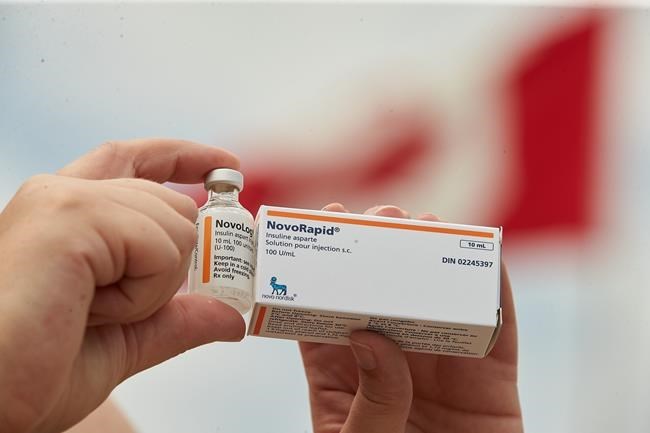The federal Liberals and New Democrats have reached a deal that would allow every Canadian with a health card to access free diabetes medication and birth control, the NDP confirmed Friday.
The coverage is to be included in the first piece of a national pharmacare program, with legislation expected to be introduced in the House of Commons next week.
It's a critical piece of the supply-and-confidence pact between the two parties, in which the NDP agreed to support the Liberals on key votes in the Commons in exchange for movement on shared priorities.
NDP Leader Jagmeet Singh threatened in recent weeks to pull out of the deal if the Liberals didn't agree to certain terms by a March 1 deadline.
Singh said in an interview Friday that he has received assurance from the government the tabled bill will refer to the principles of the Canada Health Act and to single-payer publicly delivered pharmacare.
The deal includes all insulin for Type 1 and Type 2 diabetes, Singh said, as well as additional diabetes drugs and a fund for supplies such as devices for glucose monitoring.
Singh said in an interview that it's "a very significant list of insulin and insulin-like medications."
However, the program will not include Ozempic, a new medication for diabetes that has been used off-label as a weight-loss drug.
The government is also expected to include contraceptives in line with what British Columbia covers. That includes IUDs and emergency contraception, most commonly known as morning-after pills.
Ontario also provides many contraceptives for people under the age of 25 who don't have private insurance. Manitoba's government has already pledged to do so as well.
Abortion pills, which are different than morning-after pills, are already offered for free at pharmacies across Canada.
The New Democrats said birth control coverage will help millions of women and gender-diverse people.
In recent months, both Singh and Prime Minister Justin Trudeau have spoken out against a backsliding of abortion access around the world, including in the United States.
Singh said it was important to include coverage for contraceptives in order to protect a woman's right to choose, and in 2022 he raised the issue to Trudeau after Roe vs. Wade was overturned by the U.S. Supreme Court.
"That right to choose means nothing unless we have access to that right," Singh said in an interview with The Canadian Press.
The coverage for diabetes medicines and the fund for medical equipment will help families who have children and parents with the chronic disease, the NDP said.
But it's also in part to fulfil a promise Singh said he made to a child he met years ago.
"He told me he's not worried about his life-threatening illness, but he's worried about how much it costs (for his parents)," Singh said.
"And now I can say to him and millions of other Canadians that they're gonna be able to get diabetes medication."
All provinces cover 80 per cent of out-of-pocket costs for youth with Type 1 diabetes, but the coverage for adults with Type 2 diabetes varies widely — from zero per cent in Nova Scotia, New Brunswick and Alberta to a high of 62 per cent in Ontario, data from Diabetes Canada show.
It means that depending on their location households can be out thousands of dollars a year for diabetes medicines and supplies.
In the first iteration of their pact, the Liberals and NDP initially agreed to pass a pharmacare bill by the end of 2023.
But in December, both parties agreed to add negotiating time, pinning March 1 as a deadline for the government to table legislation.
The broad strokes of a pharmacare deal were in place early last week, but the parties were still in talks about which drugs would be covered in the first go-round of a national single-payer program.
As of Thursday night, the parties had agreed to include birth control and diabetes medications, said a source close to the talks, and the only outstanding issue at the negotiating table was what type of diabetes supplies should be covered.
Liberals made it clear they had about $800 million to spend for an initial program, said the source, who was granted anonymity because they aren't authorized to speak publicly about the details of the closed talks.
In addition to contraceptives, the parties considered whether to cover antibiotics, cholesterol medicines, blood pressure medication and psychological medications such as antidepressants, the source said.
The Liberal government said it would not comment on the deal until the legislation was introduced, and the NDP said some final details may still be worked out over the weekend.
Liberals have previously cited concerns about the potential costs of pharmacare, even as the NDP pushed for the program to include more right off the bat.
A financial commitment will be coming soon, Singh said, but it won't necessarily be in the spring federal budget. He wouldn't provide further details.
If the federal government moves towards fully implementing national pharmacare, that wider program is expected to cost roughly $40 billion a year.
The Liberals campaigned on a promise to implement a national pharmacare program in the 2019 election, but made no such pledge when they went back to the polls in 2021.
This report by The Canadian Press was first published Feb. 23, 2024.
Mickey Djuric, Laura Osman and Mia Rabson, The Canadian Press



